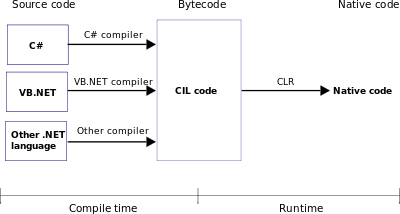Common Language Runtime
This article needs additional citations for verification. (September 2014) |
| Program execution |
|---|
| General concepts |
| Types of code |
| Compilation strategies |
| Notable runtimes |
|
| Notable compilers & toolchains |
|
The Common Language Runtime (CLR), the virtual machine component of Microsoft's .NET framework, manages the execution of .NET programs. A process known as just-in-time compilation converts compiled code into machine instructions which the computer's CPU then executes.[1] The CLR provides additional services including memory management, type safety, exception handling, garbage collection, security and thread management. All programs written for the .NET framework, regardless of programming language, are executed by the CLR. All versions of the .NET framework include CLR.
CLR implements the Virtual Execution System (VES) as defined in the Common Language Infrastructure (CLI) standard, initially developed by Microsoft itself. A public standard defines the Common Language Infrastructure specification.[2]

| CLR version | .NET version |
|---|---|
| 1.0 | 1.0 |
| 1.1 | 1.1 |
| 2.0 | 2.0, 3.0, 3.5 |
| 4 | 4, 4.5, 4.6 |
Benefits
The runtime provides the following benefits:-
- Performance improvements.
- The ability to easily use components developed in other languages.
- Extensible types provided by a class library.
- Language features such as inheritance, interfaces, and overloading for object-oriented programming.
- Support for explicit free threading that allows creation of multithreaded, scalable applications.
- Support for structured exception handling.
- Support for custom attributes.
- Garbage collection.
- Use of delegates instead of function pointers for increased type safety and security. For more information about delegates, see Common Type System.
See also
References
- ^ a b "Common Language Runtime (CLR)". MSDN Library. Retrieved 14 November 2013.
- ^ "ECMA C# and Common Language Infrastructure Standards". Visual Studio Developer Center. Retrieved 14 November 2013.
